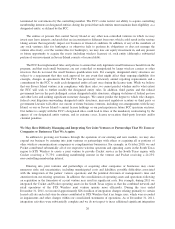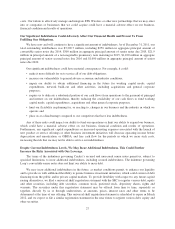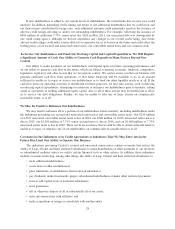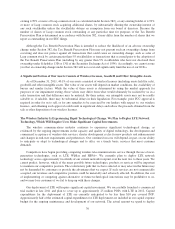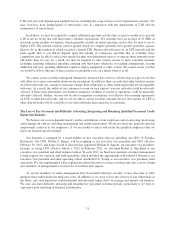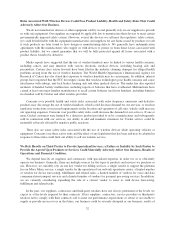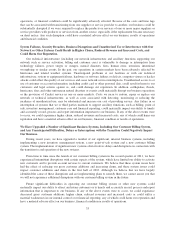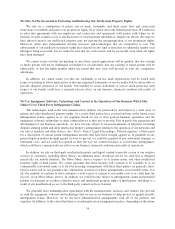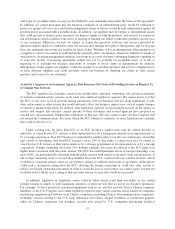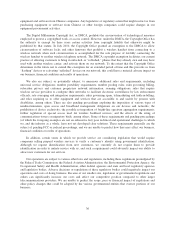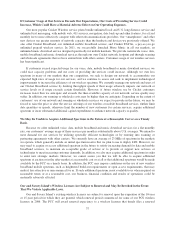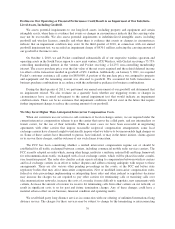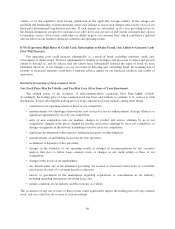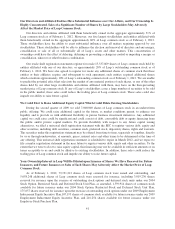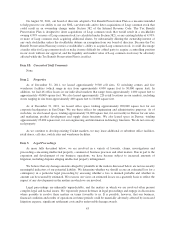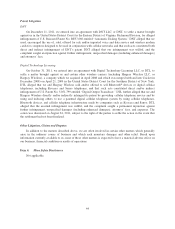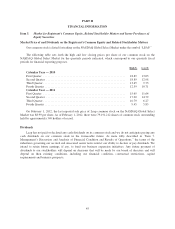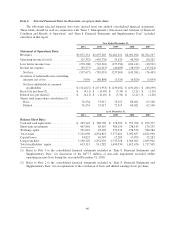Cricket Wireless 2011 Annual Report Download - page 46
Download and view the complete annual report
Please find page 46 of the 2011 Cricket Wireless annual report below. You can navigate through the pages in the report by either clicking on the pages listed below, or by using the keyword search tool below to find specific information within the annual report.equipment and software from Chinese companies. Any legislative or regulatory action that might restrict us from
purchasing equipment or software from Chinese or other foreign companies could require changes in our
equipment procurement activities.
The Digital Millennium Copyright Act, or DMCA, prohibits the circumvention of technological measures
employed to protect a copyrighted work, or access control. However, under the DMCA, the Copyright Office has
the authority to exempt for three years certain activities from copyright liability that otherwise might be
prohibited by that statute. In July 2010, the Copyright Office granted an exemption to the DMCA to allow
circumvention of software locks and other firmware that prohibit a wireless handset from connecting to a
wireless network when such circumvention is accomplished for the sole purpose of lawfully connecting the
wireless handset to another wireless telephone network. The DMCA copyright exemption facilitates our current
practice of allowing customers to bring in unlocked, or “reflashed,” phones that they already own and may have
used with another wireless carrier, and activate them on our network. To the extent that the Copyright Office
determines in the future not to extend this exemption for an extended period of time and this prevents us from
“flashing” devices or activating “reflashed” devices on our network, this could have a material adverse impact on
our business, financial condition and results of operations.
We also are subject, or potentially subject, to numerous additional rules and requirements, including
universal service obligations; number portability requirements; number pooling rules; rules governing billing,
subscriber privacy and customer proprietary network information; roaming obligations; rules that require
wireless service providers to configure their networks to facilitate electronic surveillance by law enforcement
officials; rate averaging and integration requirements; rules governing spam, telemarketing and truth-in-billing;
and rules requiring us to offer equipment and services that are accessible to and usable by persons with
disabilities, among others. There are also pending proceedings exploring the imposition of various types of
nondiscrimination, open access and broadband management obligations on our devices and networks; the
prohibition of device exclusivity; the possible re-imposition of bright-line spectrum aggregation requirements;
further regulation of special access used for wireless backhaul services; and the effects of the siting of
communications towers on migratory birds, among others. Some of these requirements and pending proceedings
(of which the foregoing examples are not an exhaustive list) pose technical and operational challenges to which
we, and the industry as a whole, have not yet developed clear solutions. These requirements generally are the
subject of pending FCC or judicial proceedings, and we are unable to predict how they may affect our business,
financial condition or results of operations.
In addition, certain states in which we provide service are considering legislation that would require
companies selling prepaid wireless services to verify a customer’s identity using government identification.
Although we request identification from new customers, we currently do not require them to provide
identification in order to initiate service with us, and such a requirement could adversely impact our ability to
attract new customers for our services.
Our operations are subject to various other laws and regulations, including those regulations promulgated by
the Federal Trade Commission, the Federal Aviation Administration, the Environmental Protection Agency, the
Occupational Safety and Health Administration, other federal agencies and state and local regulatory agencies
and legislative bodies. Adverse decisions or regulations of these regulatory bodies could negatively impact our
operations and costs of doing business. Because of our smaller size, legislation or governmental regulations and
orders can significantly increase our costs and affect our competitive position compared to other larger
telecommunications providers. We are unable to predict the scope, pace or financial impact of regulations and
other policy changes that could be adopted by the various governmental entities that oversee portions of our
business.
36


